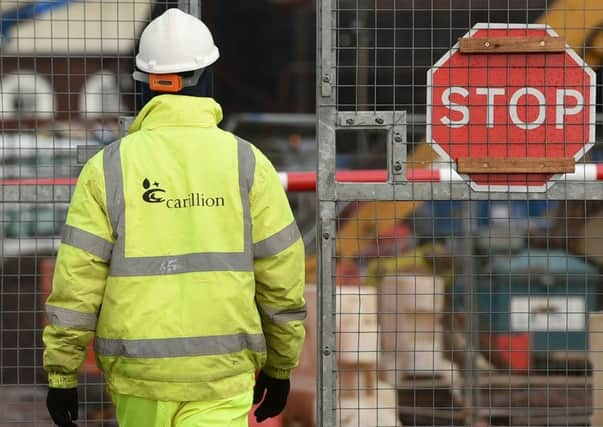Carillion collapse puts '˜thousands' of Scottish jobs at risk


The Unite trade union said it could not specify how many jobs could be lost north of the Border after the firm was taken into the hands of liquidators yesterday morning.
But union leaders said they believed the number would run into thousands following the failure to find a funding deal to save Carillion.
Advertisement
Hide AdAdvertisement
Hide AdThe UK government, which is handling the liquidation process, has told Carillion employees to turn up to work, insisting “you will get paid”.
However, those on private sector contracts, unlike their public sector counterparts, will only be protected for 48 hours after the firm’s collapse.
Carillion has a number of high-profile contracts north of the Border.
The Aberdeen Western Peripheral Route is among affected projects, with the company’s list of existing clients including Registers of Scotland, the Scottish Children’s Reporter Administration, West of Scotland Housing Association and NHS Greater Glasgow and Clyde.
The firm was also in charge of a contract awarded last year by Network Rail to deliver platform extension works at Waverley Station. Carillion also has two UK-wide facilities management contracts with the Ministry of Defence worth £158 million, which includes 83 military sites in Scotland.
The Scottish Government said it had been “working to manage or eliminate risks” associated with Carillion after the firm’s financial difficulties became apparent in July last year.
Carillion, which has been struggling under £900m of debt and a £590m pension deficit, has seen its shares price plunge more than 70 per cent in the past six months after making a string of profit warnings and breaching its financial covenants. Lenders – including Royal Bank of Scotland, as well as HSBC, Barclays and Santander – are reportedly set to lose an estimated £2 billion as a result of the collapse.
Reports yesterday claimed Carillion had asked the government to provide funds of £20m to help it secure more money from the banks and avoid going into liquidation, but was unable to secure a deal. The firm boasts a Scot – former Weir Group head Keith Cochrane – as its interim chief executive following the departure of Richard Howson in July. Carillion has swallowed up big-name firms including Mowlem and Alfred McAlpine over the past 15 years and had a takeover bid for Balfour Beattie rejected in 2014.
Advertisement
Hide AdAdvertisement
Hide AdPoliticians, unions and trade bodies warned the situation should be a “wake-up call” for the government to highlight the risks of the privatisation of public services and over-reliance on major contractors.
Unite Scotland spokesman Pat Rafferty said: “There needs to be a government inquiry to establish just what went wrong at Carillion so that lessons can be learned. Meantime, the administrators have to determine what contracts held by Carillion can be brought into public control.”
A damning statement from the Institute of Directors said the situation demonstrated that major providers of public services “must be governed in a prudent manner” and urged the government to consider “how it can better monitor the robustness of governance at key contractors”.
Roger Barker, the IoD’s head of corporate governance, said: “Today’s outcome suggests that effective governance was lacking at Carillion and we must now consider if the board and shareholders have exercised appropriate oversight prior to the collapse.
“The relaxation of clawback conditions for executive bonuses in 2016 appears in retrospect to be highly inappropriate. It does no good to the reputation of UK business when top managers appear to benefit in spite of the collapse of the organisations that they are responsible for.”
Brian Berry, chief executive of the Federation of Master Builders, said: “Carillion’s liquidation raises serious questions for the government, not least about its over-reliance on major contractors.”
Tim Roache, GMB general secretary, called for Carillion contracts to be brought back into public ownership.
David Chapman, a civil servant working for the Insolvency Service, has been appointed liquidator of Carillion, backed up by six liquidators from PwC. It is thought that many of Carillion’s workers could ultimately be transferred over to whichever of the firm’s rivals ultimately pick up its former contracts.
Advertisement
Hide AdAdvertisement
Hide AdDavid Lidington, the minister for the Cabinet Office, said: “Since profit warnings were first issued in July, the government has been closely monitoring the situation and has been in constructive discussion with Carillion while it sought to refinance its business.
“For clarity, all employees should keep coming to work. You will continue to get paid.”
Insolvency experts pointed to the “extremely rare” step of moving straight into liquidation when the company is immediately wound up.
David Birne, insolvency partner at chartered accountants HW Fisher & Company, said: “For a company of Carillion’s size, it is extremely rare to opt for a liquidation rather than an administration – and a compulsory liquidation at that. It suggests there is little, if anything, of value within the company to be saved. Almost every big insolvency in recent years has been a move towards administration.”
Holyrood’s economy secretary Keith Brown said: “The Scottish Government has been working to manage or eliminate risks associated with Carillion’s difficulties since July last year and we have contingency plans in place for affected contracts, including the AWPR, where the contract contains a mechanism for the remaining two joint venture partners to deliver the project and we expect that work to continue.”
